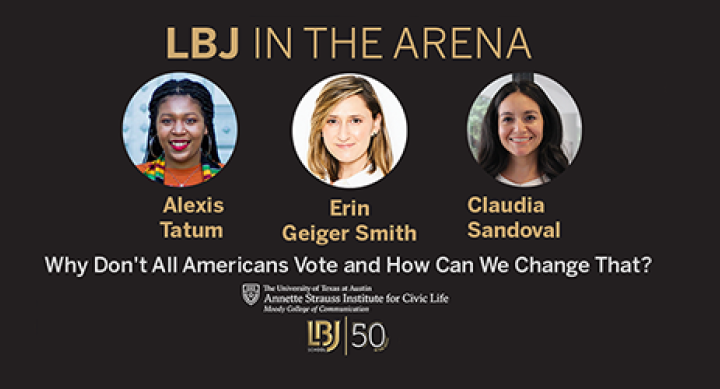
Voting — the simple act of marking a ballot to vote for the candidate of your choice sounds simple enough. However, about 40 percent of Americans and half of the country's young adults did not vote in the 2016 presidential election and the numbers are even lower for non-presidential races. Why? Journalist and UT alumna Erin Geiger Smith answers that question and more in her new book, Thank you for Voting: The Maddening, Enlightening, Inspiring Truth About Voting in America. She joined us — along with Claudia Sandoval, a second-year graduate student at the LBJ School, and Alexis Tatum, a graduate of the Moody College of Communication — to discuss the long and continuing fight for voting equality, why so few Americans today vote, and innovative ways to educate and motivate people to get out and vote.
This session of LBJ In the Arena is presented in partnership with The Annette Strauss Institute for Civic Life, a part of the Moody College of Communication at the University of Texas at Austin.
Register to Vote | Key News on Voting | Books on Voting and the Right to Vote
Register to vote
- Visit MoveTexas.org to register or update your registration, and find opportunities to help get out the vote and protect the vote.
- VoteTexas.gov is the official site for voting information for Texans, including what's on your ballot.
- Sign up for alerts at TurboVote.org.
- Vote411.org has up-to-date information on deadlines, what you need to vote, and other important information for all 50 states.
- PowerthePolls.org has information about becoming a poll worker.
- VotoLatino.org is a hub for information designed to empower and unite the LatinX community.
- Text this information to five friends and encourage them to register, stay on top of deadlines and cast their ballots. Outside Texas, use Vote.org.
News on voting
How the Case for Voter Fraud was Tested — and Utterly Failed
ProPublica, June 19, 2018
From a new Supreme Court ruling to a census question about citizenship, the campaign against illegal registration is thriving. But when the top proponent was challenged in a Kansas courtroom to prove that such fraud is rampant, the claims went up in smoke.
Waiting to Vote (Report)
The Brennan Center for Justice, June 3, 2020
Long waits at polling places are disruptive, disenfranchising, and all too common. Black and Latino voters are especially likely to endure them. Though completed before the eruption of the coronavirus, this report is even more critical now because it provides information regarding community needs as well as mistakes commonly made in planning for and staffing in-person voting. While the risk of Covid-19 will no doubt move more voters to cast their ballots by mail, some communities — more typically communities of color rely on polling places. We must make sure that there are in-person options, and that they have enough of the right kinds of resources.
Books on voting, the right to vote and gerrymandering
The Right to Vote
Alexander Keyssar
Basic Books, June 2009
Originally published in 2000, The Right to Vote traced the evolution of suffrage from the American Revolution to the end of the 20th century. In this revised and updated edition, Keyssar carries the story forward, from the disputed presidential contest of 2000 through the 2008 campaign and the election of Barack Obama. The Right to Vote is a sweeping reinterpretation of American political history as well as a meditation on the meaning of democracy in contemporary American life.
The Women's Suffrage Movement
Edited by Sally Roesch Wagner
Penguin Classics, March 2019
Comprised of historical texts spanning two centuries, The Women's Suffrage Movement is a comprehensive and singular volume with a distinctive focus on incorporating race, class and gender, and illuminating minority voices. This intersectional anthology features the writings of the most well-known suffragists, such as Elizabeth Cady Stanton and Susan B. Anthony, alongside accounts of those often overlooked because of their race, from Native American women to African American suffragists like Ida B. Wells and the three Forten sisters. The editor and introducer, Sally Roesch Wagner, is a pre-eminent scholar of the diverse backbone of the women's suffrage movement, the founding director of the Matilda Joslyn Gage Foundation, and serves on the New York State Women's Suffrage Commission.
Ratf**ked: Why Your Vote Doesn't Count
David Daley
W.W. Norton & Company, June 2016
David Daley's Ratf**ked documents the effort of Republican legislators and political operatives to hack American democracy through an audacious redistricting plan called REDMAP. Since the revolutionary election of Barack Obama, a group of GOP strategists has devised a way to flood state races with a gold rush of dark money, made possible by Citizens United, in order to completely reshape Congress—and our democracy itself.
Remember the Ladies
Angela P. Dodson
Hachette Book Group, May 2017
From the birth of our nation to the recent crushing defeat of the first female presidential candidate, this book highlights women's impact on United States politics and government. It documents the fight for women's right to vote, drawing on historic research, biographies of leaders, and such original sources as photos, line art, charts, graphs, documents, posters, ads, and buttons. It presents this often-forgotten struggle in an accessible, conversational, relevant manner for a wide audience.